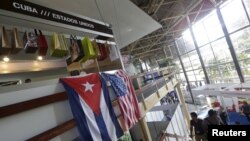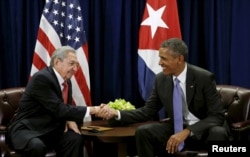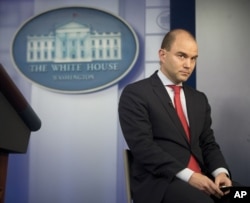The White House announced changes Tuesday to travel and trade restrictions on Cuba, ahead of President Barack Obama’s historic visit to the island nation next week.
The easing of restrictions marked the latest round of efforts to improve relations between the two countries since the formal restoration of diplomatic relations last year. The changes open up educational travel to Cuba for individual Americans, allow Cubans working in the United States to earn salaries, and reduce trade and financial barriers to improve business ties between the two countries.
In a briefing call with reporters, White House Deputy National Security adviser Ben Rhodes said the easing is part of a continued effort to "adjust our policies to empower the Cuban people and improve their lives."
The changes, effective Wednesday, allow for Cuban nationals in non-immigrant status to receive salaries in the United States. U.S. companies also can sponsor Cuban nationals for work in the United States.
More exchanges permitted
The new amendments increase opportunities for "people to people" exchanges, including allowing individual U.S. citizens to travel to Cuba and American support of educational projects in Cuba through grants and scholarships.
Robert Muse, a Washington, D.C.-based attorney who specializes in U.S. laws relating to Cuba, said the changes effectively mean there are no restrictions for Americans traveling to Cuba.
"Without saying so, the Obama administration has deregulated travel to Cuba," he said.
John Kavulich, a senior policy adviser at the U.S. Trade and Economic Council, said, "This change in travel was all driven by the airlines, because airlines need to fill seats if they have regularly scheduled service. They need individuals, not just groups."
The U.S. and Cuba are expected to resume scheduled commercial air flights, 110 flights a day, later this year.
Tuesday's changes also included amendments relating to licensing of Cuban exports and cargo, and allowed for Cubans to open U.S. bank accounts from Cuba.
The administration's goal with the monetary policy change is to "re-create what the Cuban Revolution destroyed, a middle class in Cuba. By supporting small businesses, exporting directly to small businesses, that's all about resurrecting the middle class," Kavulich said.
Restrictions on direct U.S. investment in Cuba and Cuban imports to the United States remain in place because of the embargo with Cuba. Tourist travel to Cuba also remains prohibited. The amendments mark the fifth round of changes in Commerce and Treasury restrictions.
Earlier, U.S. Treasury Secretary Jacob Lew said the new steps toward normalized relations with Cuba "build on the actions of the last 15 months as we continue to break down economic barriers, empower the Cuban people and advance their financial freedoms, and chart a new course in U.S.-Cuban relations."
Embargo ‘an impediment’
Rhodes, in the briefing, said the administration welcomed efforts to engage with Congress on lifting the embargo fully or in part.
"At a certain point, the embargo is an impediment to the very engagement that has a chance of promoting a better life for the Cuban people," he said.
Outstanding U.S. property claims dating back to the early days of the Fidel Castro regime, as well as Cuba’s reparation claims, remain a continuing obstacle in the relationship between the two countries.
Rhodes said the administration believed it could make "significant progress" in the dialogue regarding those claims.
"The resolution of those claims can also help open up space for American businesses to engage in greater commercial activity with Cuba, so there is some incentive for Cuba to resolve those issues," Rhodes said.
Historic visit
Obama will become the first sitting U.S. president to visit Cuba in nearly 90 years when he arrives there next week.
The two nations endured some 50 years of hostilities, after revolutionary Fidel Castro overthrew the U.S.-supported dictator Fulgencio Batista.
Obama and Cuban President Raul Castro, Fidel Castro's younger brother, renewed diplomatic relations in December 2014, eased trade barriers in the months since then and reopened embassies in Havana and Washington.
VOA's Ken Bredemeier and Bernard Shusman contributed to this report.






